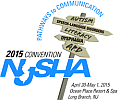Interprofessional Collaboration: What SLPs and Other Professionals Need to Know
Thursday, 4:00pm to 6:00pm
Seabright
Poster 2
The purpose of this study was to identify the components of successful team collaboration between speech-language pathologists (SLPs) and professionals from other disciplines. Currently, the limitations of collaborative practice and interprofessional education programs hinder the potential for optimal therapeutic outcomes. To assist in the development of effective interprofessional education programs, the following questions must be answered: What specific competencies should interprofessional programs teach and emphasize? What barriers to collaboration should be addressed? A survey was completed by 100 SLPs across various collaborative work settings. Participants provided information about teamwork experiences, including personal opinions about the knowledge, skills, and attitude competencies required for collaboration, as well as barriers to teamwork. Overall, there was much agreement about the most significant competencies for teamwork and barriers faced frequently in collaboration. The prominence of these barriers in the field today reinforces the need for adequate interprofessional education programs. To aid in the development of effective interprofessional training programs, the important competencies reported in this study may be targeted to address the challenges to successful teamwork.
Track:
Multi-Interest
